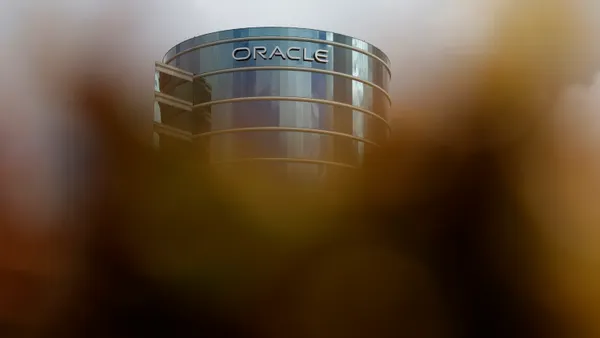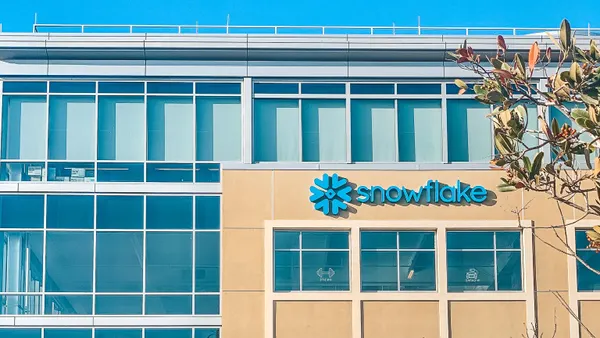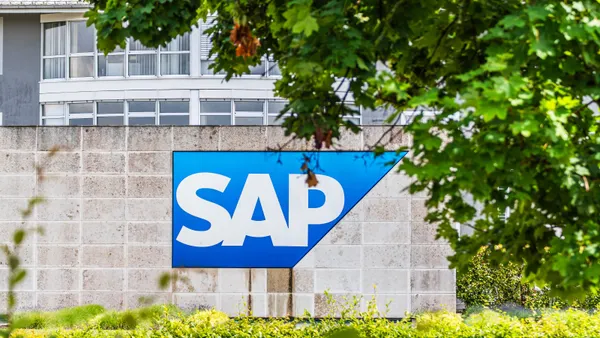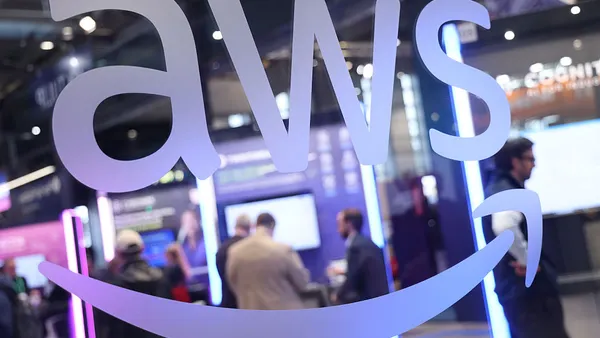Across the slim market of hyperscale infrastructure as a service providers, Google Cloud is a distant third. Its offerings, dwarfed by pioneer Amazon Web Services and outshone by pure-play provider Microsoft, are built on cutting edge technologies that are a bit, well, Googly.
Google Cloud evokes the helicopter hats of its parent company Alphabet Inc. As a business unit in Google, with an $8 billion annual revenue run rate, Google Cloud is larger than many vendors.
It has an advantage AWS cannot boast, akin to Microsoft's portfolio: Small- and medium-sized businesses make large commitments to G Suite, which is a seamless route to IaaS customers.
"It's easy to land and expand," said Dave Bartoletti, VP, principal analyst at Forrester, in an interview with CIO Dive. "Today I think that Google's primary competitor is not AWS, it's Microsoft."
It's a smart play for Google to capitalize on G Suite inroads to make introductions to customer teams running infrastructure.
Reality with Google Cloud's position in the market sets in. It is unlikely to unseat AWS, which in 2018 boasted 47.8% of the IaaS public cloud market. But enterprises are settling on hybrid and multicloud strategies.
"What that means is that Google has the opportunity to pick up a percentage of enterprise workloads," said Blair Hanley Frank, principal analyst at ISG, in an interview with CIO Dive. "They don't necessarily need to be all things to their customers, because their customers are going to have another cloud vendor anyway."
Google doesn't "necessarily need to be all things to their customers, because their customers are going to have another cloud vendor anyway."

Blair Hanley Frank
Analyst at ISG
Google Cloud's renaissance began under former CEO Diane Greene. The company had to shift from encouraging companies to move toward a "more Googly way" of building and operating cloud software, said Hanley Frank.
Google Cloud's leadership pushed it to become a general purpose platform accessible to enterprise.
Amazon Web Services had an "early head start and they've worked very aggressively to maintain that," said Barry Libenson, Global CIO of Experian and CIO Dive's 2019 CIO of the Year. In response, Microsoft offered aggressive prices to lure organizations from AWS.
Google has since shifted to offer incentives for companies to adopt its cloud services, Libenson said. "With Thomas Kurian moving from Oracle over to Google, we're sort of seeing a whole new play emerge that was never really competitive all of a sudden become really interesting."
Kurian joined Google Cloud as CEO this year after 22 years at Oracle. Under his leadership, Google Cloud has grown its sales force and brought on Kirsten Kliphouse, a Red Hat and Microsoft veteran, to head sales in North America. In April, the company also tapped Robert Enslin, a longtime SAP executive, as president of global customer operations.
Kurian has made "dramatic changes," Will Grannis, founder and director of Google Cloud's Office of the CTO, told CIO Dive in an email.
On top of making "aggressive" investments in product and sales, services and go-to market teams, Kurian has specialized sales by industry and rolled out programs catering to its largest customers and channel partners, Grannis said.
Growing an ecosystem of tool distributors, integrators and managed service providers gives customers an easier path to access service and a support system once they adopt. It's an area competitors Microsoft, AWS and IBM have mastered.
Google Cloud has brought on legacy technology leaders who understand how the enterprise works. It has driven customer momentum, with high profile partnerships with the Mayo Clinic and retailer-centric solutions, including for Macy's.
"With Thomas Kurian moving from Oracle over to Google, we're sort of seeing a whole new play emerge that was never really competitive all of a sudden become really interesting."

Barry Libenson
Global CIO at Experian and CIO Dive's 2019 CIO of the Year
Kurian has emphasized streamlining Google Cloud's go-to-market, Hanley Frank said. It comes down to flexibility in contract terms, standard contracting, standard discounting and having a go to market organization focused on speaking the "enterprise cloud language rather than just the Google language."
The backstory
Google Cloud has had three phases in the IaaS space, according to Bartoletti:
-
It jumped into the market as the cheapest IaaS option offering easy to consume with cheap storage and networking.
-
Phase two focused on developers, development and what the public cloud made possible — advanced internet of things, analytics and machine learning capabilities. Underlying it all was open source technology.
-
Kurian brought about Google Cloud's third and current phase: the enterprise years. "it's the next decade of cloud, how enterprises [are] going to transform their core business applications using cloud platforms."
Forrester research estimates 80-90% of enterprise applications haven't touched the cloud, creating a market opportunity for the leading cloud providers.
Kurian has shifted Google to become more open to enterprise customers and learning needs in verticals, understanding where customers are in terms of transformation, according to Bartoletti. A key space where this plays out is in retail, as companies have grown wary of Amazon influence.
Google Cloud is particularly focused on six industries, Grannis said:
-
Financial services
-
Telecommunications, media and entertainment
-
Retail
-
Healthcare and life sciences
-
Manufacturing and industrial
-
Public sector
Google Cloud has stood out in its technical capabilities and has courted attention with major features and leading AI development. Where customers have hesitated is in life after adoption.
"I think what [Forrester] primarily hear[s] about from customers when we evaluate Google Cloud Platform is complexity in the support and communication with Google," Bartoletti said.
Customers want a dedicated account manager who tracks companies through the lifecycle of their Google relationship, not passing them to different support organizations.
Every company wants to experience the same treatment as premier customers, Bartoletti said. But that's starting to change. Customer sentiment is evolving where customers treat Google Cloud like a partner, rather than the company going up against AWS and Azure.



 Read more
Read more









